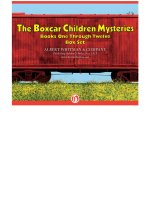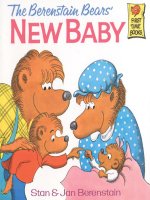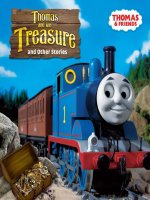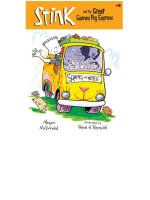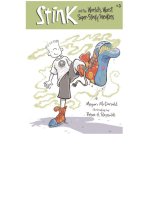Gertrude chandler warner the boxcar children mysteries lve (v5 0)
Bạn đang xem bản rút gọn của tài liệu. Xem và tải ngay bản đầy đủ của tài liệu tại đây (21.86 MB, 901 trang )
The Boxcar Children Mysteries
Box Set
Books One Through Twelve
Gertrude Chandler Warner
Albert Whitman & Company
Chicago, Illinois
CONTENTS
The Boxcar Children (The Boxcar Children Mysteries Book One)
Surprise Island (The Boxcar Children Mysteries Book Two)
The Yellow House Mystery (The Boxcar Children Mysteries Book Three)
Mystery Ranch (The Boxcar Children Mysteries Book Four)
Mike’s Mystery (The Boxcar Children Mysteries Book Five)
Blue Bay Mystery (The Boxcar Children Mysteries Book Six)
The Woodshed Mystery (The Boxcar Children Mysteries Book Seven)
The Lighthouse Mystery (The Boxcar Children Mysteries Book Eight)
Mountain Top Mystery (The Boxcar Children Mysteries Book Nine)
Schoolhouse Mystery (The Boxcar Children Mysteries Book Ten)
Caboose Mystery (The Boxcar Children Mysteries Book Eleven)
Houseboat Mystery (The Boxcar Children Mysteries Book Twelve)
A Biography of Gertrude Chandler Warner
The Boxcar Children
GERTRUDE CHANDLER WARNER
Illustrated by L. Kate Deal
ALBERT WHITMAN & Company, Chicago, Illinois
Contents
CHAPTER
I. THE FOUR HUNGRY CHILDREN
II. NIGHT IS TURNED INTO DAY
III. A NEW HOME IN THE WOODS
IV. HENRY HAS TWO SURPRISES
V. THE EXPLORERS FIND TREASURE
VI. A QUEER NOISE IN THE NIGHT
VII. A BIG MEAL FROM LITTLE ONIONS
VIII. A SWIMMING POOL AT LAST
IX. FUN IN THE CHERRY ORCHARD
X. HENRY AND THE FREE-FOR-ALL
XI. THE DOCTOR TAKES A HAND
XII. JAMES HENRY AND HENRY JAMES
XIII. A NEW HOME FOR THE BOXCAR
ABOUT THE AUTHOR
I—The Four Hungry Children
O
NE WARM NIGHT
four children stood in front of a bakery. No one knew them. No one knew
where they had come from.
The baker’s wife saw them first, as they stood looking in at the window of her store. The little
boy was looking at the cakes, the big boy was looking at the loaves of bread, and the two girls were
looking at the cookies.
Now the baker’s wife did not like children. She did not like boys at all. So she came to the front
of the bakery and listened, looking very cross.
“The cake is good, Jessie,” the little boy said. He was about five years old.
“Yes, Benny,” said the big girl. “But bread is better for you. Isn’t it, Henry?”
“Oh, yes,” said Henry. “We must have some bread, and cake is not good for Benny and Violet.”
“I like bread best, anyway,” said Violet. She was about ten years old, and she had pretty brown
hair and brown eyes.
“That is just like you, Violet,” said Henry, smiling at her. “Let’s go into the bakery. Maybe they
will let us stay here for the night.”
The baker’s wife looked at them as they came in.
“I want three loaves of bread, please,” said Jessie.
She smiled politely at the woman, but the woman did not smile. She looked at Henry as he put
his hand in his pocket for the money. She looked cross, but she sold him the bread.
Jessie was looking around, too, and she saw a long red bench under each window of the bakery.
The benches had flat red pillows on them.
“Will you let us stay here for the night?” Jessie asked. “We could sleep on those benches, and
tomorrow we would help you wash the dishes and do things for you.”
Now the woman liked this. She did not like to wash dishes very well. She would like to have a
big boy to help her with her work.
“Where are your father and mother?” she asked.
“They are dead,” said Henry.
“We have a grandfather in Greenfield, but we don’t like him,” said Benny.
Jessie put her hand over the little boy’s mouth before he could say more.
“Oh, Benny, keep still!” she said.
“Why don’t you like your grandfather?” asked the woman.
“He is our father’s father, and he didn’t like our mother,” said Henry. “So we don’t think he
would like us. We are afraid he would be mean to us.”
“Did you ever see him?” asked the woman.
“No,” answered Henry.
“Then why do you think he would be mean to you?” asked the woman.
“Well, he never came to see us,” said Henry. “He doesn’t like us at all.”
“Where did you live before you came here?” asked the woman.
But not one of the four children would tell her.
“We’ll get along all right,” said Jessie. “We want to stay here for only one night.”
“You may stay here tonight,” said the woman at last. “And tomorrow we’ll see what we can do.”
Henry thanked her politely.
“We are all pretty tired and hungry,” he said.
The children sat down on the floor. Henry cut one of the loaves of bread into four pieces with
his knife, and the children began to eat.
“Delicious!” said Henry.
“Well, I never!” said the woman.
She went into the next room and shut the door.
“I’m glad she is gone,” remarked Benny, eating. “She doesn’t like us.”
“Sh, Benny!” said Jessie. “She is good to let us sleep here.”
After supper the children lay down on their red benches, and Violet and Benny soon went to
sleep.
But Jessie and Henry could hear the woman talking to the baker.
She said, “I’ll keep the three older children. They can help me. But the little boy must go to the
Children’s Home. He is too little. I cannot take care of him.”
The baker answered, “Very well. Tomorrow I’ll take the little boy to the Children’s Home.
We’ll keep the others for awhile, but we must make them tell us who their grandfather is.”
Jessie and Henry waited until the baker and his wife had gone to bed. Then they sat up in the
dark.
“Oh, Henry!” whispered Jessie. “Let’s run away from here!”
“Yes, indeed,” said Henry. “We’ll never let Benny go to a Children’s Home. Never, never! We
must be far away by morning, or they will find us. But we must not leave any of our things here.”
Jessie sat still, thinking.
“Our clothes and a cake of soap and towels are in the big laundry bag,” she said. “Violet has her
little workbag. And we have two loaves of bread left. Have you your knife and the money?”
“Yes,” said Henry. “I have almost four dollars.”
“You must carry Benny,” said Jessie. “He will cry if we wake him up. But I’ll wake Violet.
“Sh, Violet! Come! We are going to run away again. If we don’t run away, the baker will take
Benny to a Children’s Home in the morning.”
The little girl woke up at once. She sat up and rolled off the bench. She did not make any noise.
“What shall I do?” she whispered softly.
“Carry this,” said Jessie. She gave her the workbag.
Jessie put the two loaves of bread into the laundry bag, and then she looked around the room.
“All right,” she said to Henry. “Take Benny now.”
Henry took Benny in his arms and carried him to the door of the bakery. Jessie took the laundry
bag and opened the door very softly. All the children went out quietly. They did not say a word.
Jessie shut the door, and then they all listened. Everything was very quiet. So the four children went
down the street.
II—Night Is Turned into Day
S
OON THE CHILDREN
left the town and came to a road. The big yellow moon was out, and they
could see the road very well.
“We must walk fast,” said Henry. “I hope the baker and his wife don’t wake up and find us
gone.”
They walked down the road as fast as they could.
“How far can you carry Benny?” asked Violet.
“Oh, I can carry him a long way,” replied Henry.
But Jessie said, “I think we could go faster if we woke him up now. We could take his hands and
help him along.”
Henry stopped and put Benny down.
“Come, Benny,” he said. “You must wake up and walk now.”
“Go away!” said Benny.
“Let me try,” said Violet. “Now, Benny, you can play that you are a little brown bear and are
running away to find a nice warm bed. Henry and Jessie will help you, and we’ll find a bed.”
Benny liked being a little brown bear, and so he woke up and opened his eyes. Henry and Jessie
took his hands, and they all went on again.
They passed some farmhouses, but the houses were dark and quiet. The children did not see
anyone. They walked and walked for a long time. Then the red sun began to come up.
“We must find a place to sleep,” said Jessie. “I am so tired.”
Little Benny was asleep, and Henry was carrying him again. The other children began to look for
a place.
At last Violet said, “Look over there,” She was pointing at a big haystack in a field near a
farmhouse.
“A fine place, Violet,” said Henry. “See what a big haystack it is!”
They ran across the field toward the farmhouse. They jumped over a brook, and then they came
to the haystack. Henry was still carrying Benny.
Jessie began to make a nest in the haystack for Benny, and when they put him into it, he went to
sleep again at once. The other children also made nests.
“Good night!” said Henry, laughing.
“It is ‘Good morning’ I should think,” replied Jessie. “We sleep in the day, and we walk all
night. When it is night again, we’ll wake up and walk some more.”
The children were so tired that they went right to sleep. They slept all day, and it was night again
when they woke up.
Benny said at once, “Oh, Jessie, I’m hungry. I want something to eat.”
“Good old Benny,” said Henry. “We’ll have supper.”
Jessie took out a loaf of bread and cut it into four pieces. It was soon gone.
“I want some water,” begged Benny.
“Not now,” said Henry. “You may have some water when it gets dark. There is a pump near the
farmhouse. But if we leave the haystack now, someone will see us.”
When it was dark, the children came out of the haystack and went quietly toward the farmhouse,
which was dark and still. Nearby was a pump, and Henry pumped water as quietly as he could. He
did not even wake up the hens and chickens.
“I want a cup,” said Benny.
“No, Benny,” whispered Henry. “You will have to put your mouth right in the water. You can
play you are a horse.”
This pleased Benny. Henry pumped and pumped, and at last Benny had all the water he wanted.
The water was cold and sweet, and all the children drank. Then they ran across the field toward the
road.
“If we hear anyone,” said Jessie, “we must hide behind the bushes.”
Just as she said this, the children heard a horse and cart coming up the road.
“Keep very still, Benny!” whispered Henry. “Don’t say a word.”
The children got behind the bushes as fast as they could, for they did not have much time to hide.
The horse came nearer and nearer and began to walk up the hill toward them. Then the children could
hear a man talking. It was the baker!
“I wonder where those children went,” he said. “I don’t think they could walk as far as Silver
City. If we don’t find them in Greenfield, we’ll go home.”
“Yes,” answered his wife. “I do not want to find them, anyway. I don’t like children, but we
must try a little while longer. We will look for them in Greenfield, and that’s all.”
The children watched until the horse and cart had gone down the road. Then they came out from
behind the bushes and looked at each other.
“My, I am glad those people did not see us!” said Henry. “You were a good boy, Benny, to keep
still.”
“We’ll not go to Greenfield.”
“I wonder how far it is to Silver City,” said Jessie.
The children were very happy as they walked along the road. They knew that the baker would
not find them. They walked until two o’clock in the morning, and then they came to some signs by the
side of the road.
The moon came out from behind the clouds, and Henry could read the signs.
“One sign says that Greenfield is this way,” he said. “The other sign points to Silver City. We
don’t want to go to Greenfield. Let’s take this other road to Silver City.”
They walked for a long time, but they did not see anyone.
“Not many people come this way, I guess,” said Henry. “But that is all the better.”
“Listen!” said Benny suddenly. “I hear something.”
“Listen!” said Violet.
The children stood still and listened, and they could hear water running.
“I want a drink of water, Henry!” said Benny.
“Well, let’s go on,” said Henry, “and see where the water is. I’d like a drink, too.”
Soon the children saw a drinking fountain by the side of the road.
“Oh, what a fine fountain this is!” said Henry, running toward it. “See the place for people to
drink up high, and a place in the middle for horses, and one for dogs down below.”
All the children drank some cold water.
“Now I want to go to bed,” said Benny.
Jessie laughed. “You can go to bed very soon.”
Henry was looking down a little side road, which had grass growing in the middle of it.
“Come!” he cried. “This road goes into the woods. We can sleep in the woods.”
“This is a good place,” said Jessie, as they walked along. “It is far away from people. You can
tell that by the grass in the road.”
“And it will be near the drinking fountain,” said Violet.
“That’s right!” cried Henry. “You think of everything, Violet.”
“It is almost morning,” remarked Jessie. “And how hot it is!”
“I’m glad it is hot,” said Henry, “for we must sleep on the ground. Let’s find some pine needles
for beds.”
The children went into the woods and soon made four beds of pine needles.
“I hope it’s not going to rain,” said Jessie, as she lay down.
Then she looked up at the sky.
“It looks like rain, for the moon has gone behind the clouds.”
She shut her eyes and did not open them again for a long time.
More clouds rolled across the sky, and the wind began to blow. There was lightning, also, and
thunder, but the children did not hear it. They were all fast asleep.
III—A New Home in the Woods
A
T LAST
Jessie opened her eyes. It was morning, but the sun was covered by clouds. She sat up
and looked all around her, and then she looked at the sky. It seemed like night, for it was very
dark. Suddenly it began to thunder, and she saw that it was really going to rain.
“What shall we do? Where shall we go?” thought Jessie.
The wind was blowing more and more clouds across the sky, and the lightning was very near.
She walked a little way into the woods, looking for a place to go out of the rain.
“Where shall we go?” she thought again.
Then she saw something ahead of her in the woods. It was an old boxcar.
“What a good house that will be in the rain!” she thought.
She ran over to the boxcar. There was no engine, and the track was old and rusty. It was covered
with grass and bushes because it had not been used for a long time.
“It is a boxcar,” Jessie said. “We can get into it and stay until it stops raining.”
She ran back as fast as she could to the other children. The sky was black, and the wind was
blowing very hard.
“Hurry! Hurry!” cried Jessie. “I have found a good place! Hurry as fast as you can!”
Henry took Benny’s hand, and they all ran through the woods after Jessie.
“It’s beginning to rain!” cried Henry.
“We’ll soon be there,” Jessie shouted back. “It is not far. When we get there, you must help me
open the door. It is heavy.”
The stump of a big tree stood under the door of the boxcar and was just right for a step. Jessie
and Henry jumped up on the old dead stump and rolled back the heavy door of the car. Henry looked
in.
“There is nothing in here,” he said. “Come, Benny. We’ll help you up.”
Violet went in next, and, last of all, Jessie and Henry climbed in.
They were just in time. How the wind did blow! They rolled the door shut, and then it really
began to rain. Oh, how it did rain! It just rained and rained. The children could hear it on the top of
the boxcar, but no rain came in.
“What a good place this is!” said Violet. “It is just like a warm little house with one room.”
After awhile the rain and lightning and thunder stopped, and the wind did not blow so hard. Then
Henry opened the door and looked out. All the children looked out into the woods. The sun was
shining, but some water still fell from the trees. In front of the boxcar a pretty little brook ran over the
rocks, with a waterfall in it.
“What a beautiful place!” said Violet.
“Henry!” cried Jessie. “Let’s live here!”
“Live here?” asked Henry.
“Yes! Why not?” said Jessie. “This boxcar is a fine little house. It is dry and warm in the rain.”
“We could wash in the brook,” said Violet.
“Please, Henry,” begged Jessie. “We could have the nicest little home here, and we could find
some dishes, and make four beds and a table, and maybe chairs!”
“No,” said Benny. “I don’t want to live here, Jessie.”
“Oh, dear, why not, Benny?” asked Jessie.
“I’m afraid the engine will come and take us away,” answered Benny.
Henry and Jessie laughed. “Oh, no, Benny,” said Henry. “The engine will never take this car
away. It is an old, old car, and grass and bushes are growing all over the track.”
“Then doesn’t the engine use this track any more?” asked Benny.
“No, indeed,” said Henry. He was beginning to want to live in the boxcar, too.
“We’ll stay here today, anyway,”
“Then can I have my dinner here?” asked Benny.
“Yes, you shall have dinner now,” said Henry.
So Jessie took out the last loaf of bread and cut it into four pieces, but it was very dry. Benny ate
the bread, but soon he began to cry.
“I want some milk, too, Jessie,” he begged.
“He ought to have milk,” said Henry. “I’ll go to the next town and get some.”
But Henry did not want to start. He looked to see how much money he had. Then he stood
thinking.
At last he said, “I don’t want to leave you girls alone.”
“Oh,” said Jessie, “we’ll be all right, Henry. We’ll have a surprise for you when you come
back. You just wait and see!”
“Good-by, Henry,” said Benny.
So Henry walked off through the woods.
When he had gone, Jessie said, “Now, children, what do you think we are going to do? What do
you think I saw over in the woods? I saw some blueberries!”
“Oh, oh!” cried Benny. “I know what blueberries are. Can we have blueberries and milk,
Jessie?”
“Yes,” Jessie was beginning. But she suddenly stopped, for she heard a noise. Crack, crack,
crack! Something was in the woods.
IV—Henry Has Two Surprises
J
ESSIE WHISPERED,
“Keep still!”
The three children did not say a word. They sat quietly in the boxcar, looking at the bushes.
“I wonder if it’s a bear,” thought Benny.
Soon something came out. But it wasn’t a bear. It was a dog, which hopped along on three legs,
crying softly and holding up a front paw.
“It’s all right,” said Jessie. “It’s only a dog, but I think he is hurt.”
The dog looked up and saw the children, and then he wagged his tail.
“Poor dog,” said Jessie. “Are you lost? Come over here and let me look at your paw.”
The dog hopped over to the boxcar, and the children got out.
Jessie looked at the paw and said, “Oh, dear! You poor dog! There is a big thorn in your foot.”
The dog stopped crying and looked at Jessie.
“Good dog,” said Jessie. “I can help you, but maybe it will hurt.”
The dog looked up at Jessie and wagged his tail again.
“Violet,” ordered Jessie, “please wet my handkerchief in the brook.”
Jessie sat down on the stump and took the dog in her lap. She patted him and gave him a little
piece of bread. Then she began to pull out the thorn. It was a long thorn, but the dog did not make any
noise. Jessie pulled and pulled, and at last the thorn came out.
Violet had a wet handkerchief ready. Jessie put it around the dog’s paw, and he looked up at her
and wagged his tail a little.
“He wants to say ‘Thank you,’ Jessie!” cried Violet. “He is a good dog not to cry.”
“Yes, he is,” agreed Jessie. “Now I had better hold him for awhile so that he will lie down and
rest his leg.”
“We can surprise Henry,” remarked Benny. “Now we have a dog.”
“So we can,” said Jessie. “But that was not my surprise. I was going to get a lot of blueberries
for supper.”
“Can’t we look for blueberries, while you hold the dog?” asked Violet.
“Yes, you can,” said Jessie. “Look over there by the big trees.”
Benny and Violet ran over to look.
“Oh, Jessie!” cried Benny. “Did you ever see so many blueberries? I guess five blueberries! No,
I guess ten blueberries!”
Jessie laughed. “I guess there are more than five or ten, Benny,” she said. “Get a clean towel and
pick them into it.”
For awhile Jessie watched Benny and Violet picking blueberries.
“Most of Benny’s blueberries are going into his mouth,” she thought with a laugh. “But maybe
that’s just as well. He won’t get so hungry waiting for Henry to come back with the milk.”
She carried the dog over to the children and sat down beside them, the dog on her lap. With her
help the towel was soon full of blueberries.
“I wish we had some dishes,” Jessie said. “Then we could have blueberries and milk.”
“Never mind,” said Violet. “When Henry comes, we can eat some blueberries and then take a
drink of milk.”
When Henry came, he had some heavy bundles. He had four bottles of milk in a bag, a loaf of
brown bread, and also some fine yellow cheese.
He looked at the dog.
“Where did you get that fine dog?” he cried.
“He came to us,” said Benny. “He is a surprise for you.”
Henry went over to the dog, who wagged his tail. Henry patted him and said, “He ought to be a
good watchdog. Why is the handkerchief on his foot?”
“He had a big thorn in his foot,” answered Violet, “and Jessie took it out and put on the
handkerchief. It hurt him, but he did not cry or growl.”
“His name is Watch,” remarked Benny.
“Oh, is it?” asked Jessie, laughing. “Watch is a good name for a watchdog.”
“Did you bring some milk?” asked Benny, looking hungrily at the bottles.
“I should say I did!” replied Henry. “Four bottles!”
“Poor old Benny!” said Jessie. “We’ll have dinner now. Or is it supper?”
“It must be supper,” said Henry, “for soon we’ll have to go to bed.”
“Tomorrow we’ll eat three times,” said Jessie.
Now Jessie liked to have things in order, and so she put the laundry bag on some pine needles
for a tablecloth. Then she cut the loaf of brown bread into five big pieces. The cheese was cut into
four.
“Dogs don’t like cheese,” remarked Benny. The poor little boy was glad, too, for he was very
hungry.
Violet put the four bottles of milk on the table, and Jessie put some blueberries and cheese at
each place.
“Blueberries!” cried Henry. “Jessie, you had two surprises for me!”
“I’m sorry we haven’t any cups,” Jessie said. “We’ll have to drink out of the bottles. Now all
come and sit down.”
So supper began, “Look, Benny,” said Henry. “You take some blueberries, then eat some brown
bread, then some cheese, then take a drink of milk.”
“It’s good!” said Benny. He began to put more blueberries into his mouth.
The dog had supper, too. Jessie gave him bread as he lay on the ground beside her, and he drank
milk out of her hand.
When supper was over, there was some milk left in each bottle.
“We’ll have the rest of the milk for breakfast,” said Jessie. “Tonight we are going to sleep on
beds. Let’s get some pine needles now.”
Soon the children had a big pile. Henry jumped into the boxcar, and Jessie gave him the pine
needles. He made four beds in one end of the car.
“This side is the bedroom,” said Jessie.
“What will the other side be?” asked Benny,
“The other side?” asked Jessie. “Let me think. I guess that will be the sitting-room, and maybe
some of the time it will be the kitchen.”
Then she said, “Come, now. Come and get washed.” She took the cake of soap and went down to
the brook.
“That will be fun, Benny,” said Violet. “We’ll splash our ‘paws’ in the brook just as Little
Brown Bear does.” She knew that Benny did not like to be washed.
The children were all very hot, and so they were glad to splash in the cold water. Benny put cold
water and soap on his face with the others and dried his hands on a towel.
“We’ll have to have a line to dry the towels on,” said Jessie.
So she took the string out of the laundry bag and tied one end of it to a tree. The other end of the
string she tied to the boxcar. This made a good clothesline. When she had washed one towel and
Violet had washed the other one, they hung both towels on the clothesline.
“It looks like home,” said Henry. “See the washing!” He laughed.
Jessie was thinking.
“We ought to get some water to drink before we go to bed,” she said. “But what shall we put it
in?”
“Let’s put all the milk into two bottles,” said Henry. “Then we can fill the other two with
water.”
“Good,” said Jessie. “You go alone to the fountain, Henry. You can hide if anyone comes
along.”
Henry went out very quietly, and soon came back with two bottles full of cold water. Benny
drank a little, but he was almost asleep.
The other children helped him into the boxcar. Then they all climbed in, Jessie carrying the dog.
He lay down at once beside her.
“It is so hot that we’ll leave the door open,” said Henry.
Soon they were fast asleep, dog and all. The moon came up, but they did not see it. This was the
first time in four days that they could go to sleep at night, as children should.
V—The Explorers Find Treasure
T
HE NEXT MORNING Jessie
woke up first, and she got up at once, for she was the housekeeper. The
dog sat in the door of the car and looked at her as she jumped down to get the milk for
breakfast. Then he jumped down after her.
Jessie walked down by the little brook and stopped to look at the waterfall. It was beautiful.
“I must look in the refrigerator,” she said with a laugh.
It was a funny refrigerator. There was a rock behind the waterfall, and the night before Jessie
had put the two bottles of milk in a hole in this rock. Now she took out the bottles and found that the
milk was very cold.
“Is it good?” called Benny, who sat in the car door.
“It is delicious!” cried Jessie. “It is cold, too.”
She got up into the car with the milk and sat down beside Benny. Then the four children drank
the milk for breakfast.
Henry said, “Today I’ll go to town and try to get some work to do. I can cut grass or work in a
garden or something. Then we’ll have something besides milk for breakfast,”
He washed his hands and face and started out.
“I’m so glad you have a dog, Jessie,” he said. “Good-by! I ’ll be back at noon.”
The children looked after Henry, and then they looked at Jessie.
“What are we going to do now, Jessie?” Benny asked his sister.
“Well, Benny,” answered Jessie, “we’ll go exploring and look for treasures. We’ll begin here at
the car and look and look until we find a dump.”
“What’s a dump?” asked Benny.
“Oh, Benny!” said Violet. “You know what a dump is. Old tin cans and old dishes and bottles.”
“Are old tin cans and dishes treasures?” Benny wanted to know.
“They will be treasures for us,” answered Jessie, laughing.
“And wheels?” asked Benny again. “Will there be any wheels on the dump?”
“Yes, maybe,” replied Violet. “But cups, Benny, and plates, and maybe spoons. You like to
drink milk out of a cup.”
“Oh, yes,” agreed Benny politely. But anyone could see that his mind was still on wheels.
The explorers started walking down the old rusty tracks, with Watch hopping along on three
legs. The other paw, still tied up with Jessie’s handkerchief, was held off the ground. But the dog
looked very happy. He liked these kind children.
They all walked along through the woods, looking this way and that. After awhile the old track
came out into the sun, and the explorers found that they were on top of a hill. They could look down
and see the town below them.
“Henry is down there,” said Jessie.
Benny was walking along behind his two sisters.
Suddenly he cried happily, “Look, Jessie! There’s a treasure—a wheel!”
The girls looked where he was pointing, and they saw a big dump with many old bottles and tin
cans on it. There were also both wheels and cups. Indeed, there were dishes of all kinds.
“Oh, Benny!” cried Jessie. “You saw the treasures first. What should we do without you!”
Violet ran over to the dump. “Here’s a white pitcher, Jessie!” she cried.
Jessie looked at it. It was all right, with only one small crack.
“Here’s a big white cup, too,” she said, happily.
“Can you use a teapot, Jessie?” asked Benny.
“Yes, indeed!” she replied. “We can put water in it. I have found two cups and a bowl. Let’s
look for spoons, too!”
Violet held up what she had found—five spoons, covered with rust.
“Good!” said Jessie. “Here’s a big kettle. Let’s pile all the dishes in it. Then we can carry them
back to the boxcar.”
Benny had found four wheels just alike and laid them to one side. Now he held up a pink cup.
There was a big crack in it, but it had a handle.
“This will be my pink cup,” said Benny.
“I hope it will hold milk,” said Jessie, laughing. “It’s a beautiful cup, Benny.”
The children laid all their treasures, even the wheels, on a board, and the girls carried the board
back to the boxcar between them. They put the dishes down by the brook.
“Now we must wash them,” said Jessie.
“All right,” agreed Benny. “We’ll wash my pink cup.”
And never did a little boy hand dishes so carefully to his sisters as Benny did.
The girls washed the dishes with soap, and Jessie used sand to get the rust off the spoons.
“There!” she said, washing the last shining spoon. “How fine they look! But I’m afraid they still
aren’t clean enough to eat from. When Henry comes, we’ll get him to build a fire. Then we can have
hot water to rinse them, and they will be very clean.”
The children sat back and admired the dishes.
Suddenly Violet cried, “Oh, I know where to put them. Come and see what I found in the car last
night.”
Both girls looked in at the door.
“Look on the door on the other side of the car,” said Violet.
All Jessie saw were two pieces of wood nailed to the closed door of the car. But she knew at
once what was in Violet’s mind. She ran to get the board they had carried from the dump and laid it
carefully across the two pieces of wood. It made a fine shelf for the dishes.
“There!” said Jessie.
The children could hardly wait to put the shining dishes on the shelf.
“Let’s put them on now,” said Violet, “and see how they look, without waiting to rinse them.”
When they were on the shelf, Violet picked some white and yellow flowers and put them in a
cup full of water in the middle of the shelf.
“There!” said Jessie, stepping back to look at it.
“You said ‘There’ three times,” remarked Benny happily.
“So I did,” replied Jessie, laughing. “And I’m going to say it again.”
She pointed into the woods and said, “There!”
Henry was coming through the woods, and he carried many funny-looking bundles in his arms.
But he would not open his bundles or tell what he had been doing until it was time for dinner.




